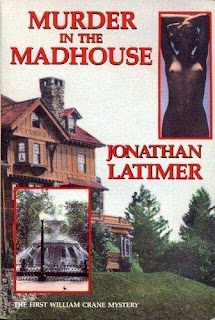He has been sent to investigate the theft of Mrs. Van Sant's metal box with $400,000 of bonds and a key to a safety deposit box with even more money. Quite soon after Crane's arrival, the murders happen. Latimer has a sparse writing style which is constantly moving forward, sometimes even skipping over details that you have to pick up on your own. It's quite enjoyable to read. Furthermore, there is no false modesty or bourgeois sensibilities covering up the behaviour of the characters. They are direct and like to party. Crane seems to drink as often as possible, often passing out in the middle of the day. The men are hitting on the women and the women are no saying no. I think this must be that depression-era prohibition culture and that Latimer hits the notes often because that's what people wanted to read. Unfortunately, he also hits the murder and sleuthing notes often, to the point where it gets kind of absurd. After the first body, two more are killed in fairly quick succession. An idiotic sheriff comes with his deputies (one of whom is his son) and is absolutely clueless and arbitrary. As it says on the back cover, it gets "daffy". I still had a lot of fun reading this and will definitely pick up more of his books. I just need to go in not expecting a whole lot in the execution of the plot and to remember that the tone is both hard-boiled and comic.
Note: the image above is not mine but it is the edition I found. It's from Library of Crime Classics line by International Polygonics ltd. New York City. Quite the amateur layout, but it captures all the key elements: a madhouse, a fountain (crucial to the plot in a not clever way) and boobs!











